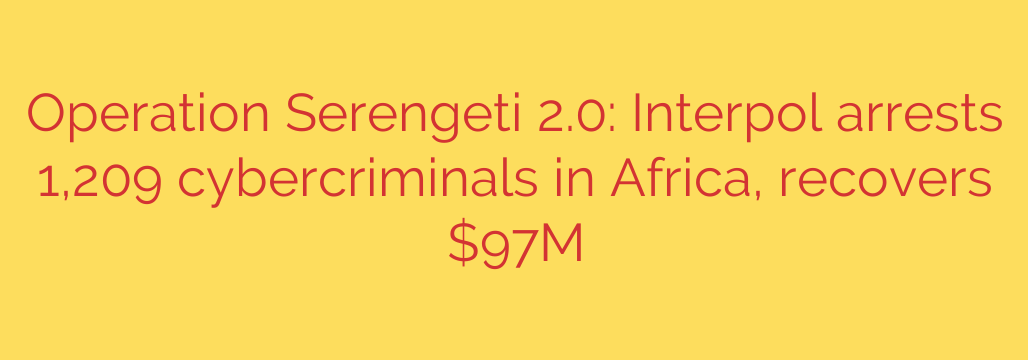
Global Cybercrime Crackdown: Over 1,200 Arrested in Major International Sting Operation
In a significant victory for global cybersecurity, a massive international law enforcement operation has dismantled numerous cybercriminal networks across Africa. The coordinated effort resulted in the arrest of over a thousand individuals and the recovery of tens of millions of dollars in illicit funds, dealing a major blow to the architects of sophisticated online fraud.
This large-scale operation underscores the growing threat of digital crime and the critical importance of international cooperation in combating it. The successful crackdown highlights the intricate web of scams targeting both individuals and businesses worldwide.
The Scale of the Takedown
The results of this recent sting, codenamed “Operation Serengeti 2.0,” are staggering and demonstrate the immense scope of modern cybercrime. The key outcomes include:
- Over 1,209 individuals arrested across the continent in connection with a wide range of online scams.
- More than $97 million in illicitly obtained funds seized or recovered.
- Thousands of fraudulent online networks and malicious infrastructure identified and shut down.
This operation was not the work of a single agency but a collaborative effort involving law enforcement from 25 African countries, working in close partnership with international policing organizations. The investigation revealed how criminal syndicates leverage technology to defraud victims on a global scale, funneling money through complex laundering schemes.
The Scams Fueling the Criminal Networks
The criminals targeted a variety of lucrative and damaging forms of online fraud. Understanding these tactics is the first step in protecting yourself and your organization. The primary schemes dismantled included:
- Business Email Compromise (BEC): This highly deceptive scam involves criminals impersonating company executives or vendors via email. They trick employees into making unauthorized wire transfers to fraudulent accounts, often resulting in devastating financial losses for the business.
- Phishing and Smishing: These attacks use fraudulent emails (phishing) or text messages (smishing) disguised as communications from legitimate sources like banks, government agencies, or popular online services. The goal is to trick victims into revealing sensitive information such as passwords, credit card numbers, and personal data.
- Romance Scams: Preying on emotions, fraudsters create fake online profiles on dating apps and social media to build relationships with their targets. After gaining their trust, they fabricate emergencies or investment opportunities to solicit money, disappearing once the funds are sent.
- Online Marketplace Scams: Criminals create fake listings for goods or services on popular online marketplaces. Victims pay for items that are never delivered, or the goods received are counterfeit or not as described.
Actionable Steps to Protect Yourself from Online Fraud
While law enforcement continues to fight cybercrime on a global scale, personal vigilance is your most effective shield. Follow these essential security practices to drastically reduce your risk of becoming a victim.
Verify All Urgent Financial Requests: If you receive an unexpected email or message from a colleague, boss, or vendor requesting an urgent payment or change in bank details, do not act immediately. Pick up the phone and verify the request using a known, trusted contact number. Never use the contact information provided in the suspicious email itself.
Scrutinize Email Senders and Links: Before clicking any link or downloading an attachment, carefully inspect the sender’s email address. Look for subtle misspellings or unusual domain names. Hover your mouse over links to see the actual destination URL before you click—if it looks suspicious, don’t proceed.
Enable Multi-Factor Authentication (MFA): MFA adds a critical layer of security to your accounts. Even if a criminal steals your password, they will be unable to log in without the second verification step, which is typically a code sent to your phone. Enable MFA on all critical accounts, including email, banking, and social media.
Be Wary of Emotional Manipulation: Scammers often use tactics that create a sense of urgency, fear, or excitement to rush you into making a poor decision. Pause and think critically before responding to any message that pressures you to act quickly, especially if it involves money or personal information.
The success of this international operation is a powerful reminder that cybercrime is a borderless threat. While authorities are making significant strides in bringing these criminals to justice, the fight requires a collective effort. By staying informed and adopting strong security habits, we can all contribute to a safer digital world.
Source: https://securityaffairs.com/181434/cyber-crime/operation-serengeti-2-0-interpol-nabs-1209-cybercriminals-in-africa-seizes-97m.html








